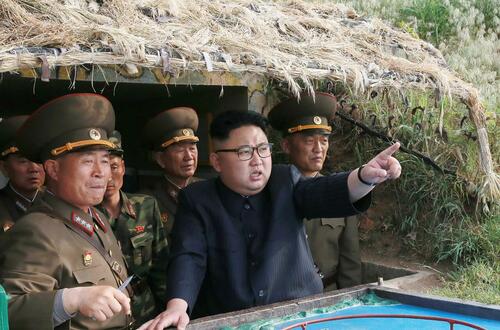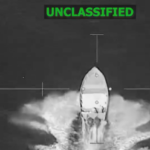
Starting last July, a US Navy nuclear-armed submarine made port call in South Korea - something which hadn't happened since 1981. As expected, North Korea began immediately ramping up its ballistic missile tests and military drills near the border, and there have been escalating threats and counter-threats since.
The New York Times is reporting that the Kim Jong-un government has plans for escalation, saying that it will soon launch some kind of lethal military action against the south, but will still seek to avoid a full-scale war.
"North Korea’s leader, Kim Jong-un, could take some form of lethal military action against South Korea in the coming months after having shifted to a policy of open hostility, U.S. officials say," the report began.

US officials indicated the recent spate of more aggressive statements from Kim should be taken seriously. "While the officials added that they did not see an imminent risk of a full-scale war on the Korean Peninsula, Mr. Kim could carry out strikes in a way that he thinks would avoid rapid escalation," the report continued.
"They pointed to North Korea’s shelling of a South Korean island in 2010 as an example," NYT noted. "The two sides exchanged artillery fire, resulting in the reported deaths of troops on both sides as well as civilians in the South, but both militaries soon stopped."
Something which came dangerously close to the 2010 deadly exchange of fire actually happened earlier this month. On Jan.5 North Korea fired over 200 artillery rounds off its West coast which landed near the South's Yeonpyeong and Baengnyeong Islands, as we detailed earlier.
Seoul condemned the "provocative act" while the North asserted the islands weren't in danger due to these drills. There were no casualties, and the shells appear to have fallen harmlessly into the sea, but it quickly raised fears of a repeat of the 2010 incident wherein four people died on Yeonpyeong island. Civilians on the area islands were ordered to seek immediate shelter in the Jan.5 incident.
Interestingly, all of this also comes at a time of deepening relations between the North Korean leader and Russia's President Putin, who is believed to be planning a trip to Pyongyang at some point in the near term. The DPRK is also widely believed to be supplying the Russian military with weapons.
VIDEO: South Korea soldiers patrol border island after North's artillery drills.
— AFP News Agency (@AFP) January 9, 2024
On the remote border island of Yeonpyeong, heavily armed soldiers locked up the beaches at dusk -- a reminder of the picturesque spot's proximity to nuclear-armed North Korea pic.twitter.com/R8PGuyiiET
* * *
The non-interventionist think tank Responsible Statecraft agrees that North Korea's threats are more than just rhetoric at this point. It asked: Are North Korea's latest threats rhetorical or real? According to some of the commentary [emphasis ZH]...
Washington’s failure to remain engaged with North Korea is the primary reason that longtime North Korea watchers Robert Carlin and Siegfried Hecker believe that Kim Jong Un has abandoned the default approach of more-or-less peaceful coexistence in favor of launching an attack against South Korea. In some ways, Kim is following the logic of Hamas, an illiberal force also in charge of a largely failed entity. Kim, too, perceives his adversaries as complacent, uninterested in any real negotiations, and vulnerable to a surprise attack. Presiding over an “open air prison” in Gaza, Hamas decided it had nothing left to lose. The North Korean leadership, in charge of an impoverished country with a horrific human rights record, may well have decided that it also has run out of options.
“The literature on surprise attacks should make us wary of the comfortable assumptions that resonate in Washington’s echo chamber but might not have purchase in Pyongyang,” Carlin and Hecker write in 38North. “This might seem like madness, but history suggests those who have convinced themselves that they have no good options left will take the view that even the most dangerous game is worth the candle.”
Starting last July, a US Navy nuclear-armed submarine made port call in South Korea – something which hadn’t happened since 1981. As expected, North Korea began immediately ramping up its ballistic missile tests and military drills near the border, and there have been escalating threats and counter-threats since.
The New York Times is reporting that the Kim Jong-un government has plans for escalation, saying that it will soon launch some kind of lethal military action against the south, but will still seek to avoid a full-scale war.
“North Korea’s leader, Kim Jong-un, could take some form of lethal military action against South Korea in the coming months after having shifted to a policy of open hostility, U.S. officials say,” the report began.

US officials indicated the recent spate of more aggressive statements from Kim should be taken seriously. “While the officials added that they did not see an imminent risk of a full-scale war on the Korean Peninsula, Mr. Kim could carry out strikes in a way that he thinks would avoid rapid escalation,” the report continued.
“They pointed to North Korea’s shelling of a South Korean island in 2010 as an example,” NYT noted. “The two sides exchanged artillery fire, resulting in the reported deaths of troops on both sides as well as civilians in the South, but both militaries soon stopped.”
Something which came dangerously close to the 2010 deadly exchange of fire actually happened earlier this month. On Jan.5 North Korea fired over 200 artillery rounds off its West coast which landed near the South’s Yeonpyeong and Baengnyeong Islands, as we detailed earlier.
Seoul condemned the “provocative act” while the North asserted the islands weren’t in danger due to these drills. There were no casualties, and the shells appear to have fallen harmlessly into the sea, but it quickly raised fears of a repeat of the 2010 incident wherein four people died on Yeonpyeong island. Civilians on the area islands were ordered to seek immediate shelter in the Jan.5 incident.
Interestingly, all of this also comes at a time of deepening relations between the North Korean leader and Russia’s President Putin, who is believed to be planning a trip to Pyongyang at some point in the near term. The DPRK is also widely believed to be supplying the Russian military with weapons.
VIDEO: South Korea soldiers patrol border island after North’s artillery drills.
On the remote border island of Yeonpyeong, heavily armed soldiers locked up the beaches at dusk — a reminder of the picturesque spot’s proximity to nuclear-armed North Korea pic.twitter.com/R8PGuyiiET
— AFP News Agency (@AFP) January 9, 2024
* * *
The non-interventionist think tank Responsible Statecraft agrees that North Korea’s threats are more than just rhetoric at this point. It asked: Are North Korea’s latest threats rhetorical or real? According to some of the commentary [emphasis ZH]…
Washington’s failure to remain engaged with North Korea is the primary reason that longtime North Korea watchers Robert Carlin and Siegfried Hecker believe that Kim Jong Un has abandoned the default approach of more-or-less peaceful coexistence in favor of launching an attack against South Korea. In some ways, Kim is following the logic of Hamas, an illiberal force also in charge of a largely failed entity. Kim, too, perceives his adversaries as complacent, uninterested in any real negotiations, and vulnerable to a surprise attack. Presiding over an “open air prison” in Gaza, Hamas decided it had nothing left to lose. The North Korean leadership, in charge of an impoverished country with a horrific human rights record, may well have decided that it also has run out of options.
“The literature on surprise attacks should make us wary of the comfortable assumptions that resonate in Washington’s echo chamber but might not have purchase in Pyongyang,” Carlin and Hecker write in 38North. “This might seem like madness, but history suggests those who have convinced themselves that they have no good options left will take the view that even the most dangerous game is worth the candle.”
Loading…






